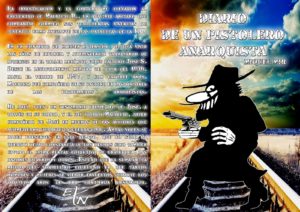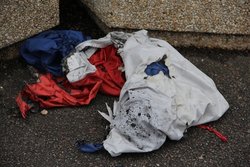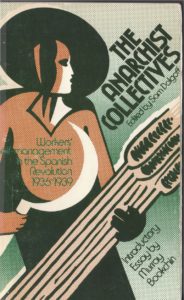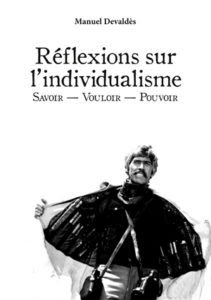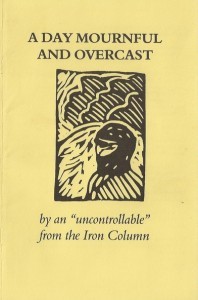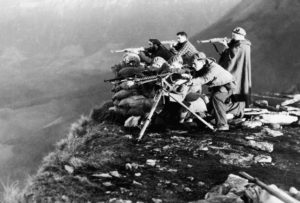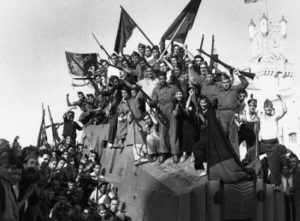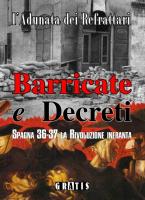La investigación y la fortuna me llevaron al encuentro de Mauricio B., un apacible anciano que compartió conmigo sus turbulentas vivencias de juventud como ayudante de las patrullas de la FAI.En un contexto de creciente tensión política vivió los años de infancia y adolescencia trabajando de aprendiz en el taller mecánico de su padrino José S. Desde el levantamiento militar de julio del 1936, hasta el verano de 1937, y con catorce años, Mauricio fue compañero de su padrino en las acciones de los patrulleros anarquistas.Continue reading Diario de un pistolero anarquista – Miquel Mir
Tag Archives: 1936
Quelques réflexions concernant l’honneur et la dignité nationale
Par Simone Weil (1936)
Le sentiment de l’honneur est évidemment la source de toutes les guerres, considérées à l’échelle de l’individu. Toutes sortes d’intérêts économiques peuvent être en jeu entre deux peuples qui se battent ; mais ce ne sont certes pas ces intérêts qui fournissent à chaque combattant l’énergie nécessaire pour dominer la peur. On peut en dire autant des questions territoriales. Qu’importait, somme toute, à un Marseillais que l’Alsace fût allemande ou française ? Qui d’entre nous, aujourd’hui, se sent malheureux parce que les Canadiens de race et de langue française font partie de l’Empire anglais ? Qui est-ce qui souffrirait si la Tunisie passait sous la domination italienne ou allemande ? Qui, surtout, est prêt à considérer ces questions comme des questions de vie ou de mort ? Elles sont à peu près aussi étrangères à chacun de nous que la présence d’Hélène à Sparte ou à Troie pouvait l’être aux guerriers grecs et troyens qui pendant dix ans moururent jour après jour auprès du rivage de la mer. Cet immortel poème de l’Iliade n’a pas vieilli.
Continue reading Quelques réflexions concernant l’honneur et la dignité nationale
The Anarchist Collectives
Sam Dolgoff (editor)
Workers’ Self-Management in the Spanish Revolution, 1936–1939
To the heroic workers and peasants of Spain!
To my comrades, the Spanish Anarchists, who perished fighting for freedom!
To the militants who continue the struggle!
Durruti is Dead, Yet Living (en/fr)
Emma Goldman (november 1936)
Durruti, whom I saw but a month ago, lost his life in the street-battles of Madrid.
My previous knowledge of this stormy petrel of the Anarchist and revolutionary movement in Spain was merely from reading about him. On my arrival in Barcelona I learned many fascinating stories of Durruti and his column. They made me eager to go to the Aragon front, where he was the leading spirit of the brave and valiant militias, fighting against fascism.
Continue reading Durruti is Dead, Yet Living (en/fr)
Réflexions sur l’individualisme
Savoir — Vouloir — Pouvoir
Ce texte de Manuel Devaldès fut publié en Janvier 1936 dans le N° 157 de La Brochure Mensuelle. Editée de 1928 à 1938 par Georges Bidault, ces brochures étaient publiées mensuellement et étaient composées d’un texte unique, soit un « classique » de l’anarchisme, soit un texte plus « actuel ». Dans le soucis de rendre la lecture plus cohérente, et pour pallier au manque de certains passages illisibles (parfois des pages entières) pour cause de mauvaise conservation, nous nous sommes permis de couper et d’assembler certains passages (deux) sans ne jamais modifier un seul mot et sans nuire au contenu du texte.
Continue reading Réflexions sur l’individualisme
A Day Mournful and Overcast
A day mournful and overcast by An ‘uncontrollable’ of the Iron Column
Published by Kate Sharpley Library (Original Spanish language publication by Nosotros, daily newspaper of the Iron Column, 1937.)
Continue reading A Day Mournful and Overcast
Remembering Spain : Italian anarchist Volunteers in the Spanish Civil War
Umberto Marzocchi
Umberto Marzocchi
He was born in Florence on 10 October 1900. A shipyard worker in La Spezia, he became an anarchist at a very early age and by 1917 was secretary of the metalworkers’ union affiliated to the USI (Italian Syndicalist Union), thanks to his youth which precluded his being mobilised for front-line service as a reprisal. During the “Red Biennium” he took part in the struggles alongside the renowned La Spezia anarchist, Pasquale Binazzi, the director of Il Libertario newspaper. In 1920 he was part of a gang of anarchists that attacked the La Spezia arsenal, overpowering the security guards and carrying off two machine guns and several rifles, in the, alas disappointed, hope of triggering a revolutionary uprising in the city. In 1921, visiting Rome to reach an agreement with Argo Secondari, he took over as organiser of the Arditi del Popolo (People’s Commandos) in the region; this organisation was to give good account of itself during the “Sarzana incidents”. Moving to Savona, he organised the meeting between Malatesta and the pro-Bolshevik Russian anarchist Sandomirsky who arrived in Rapallo in the wake of the Chicherin delegation as its Press Officer. By 1922, wanted by the fascists, he left the country, playing an active part in the activities of the anarchist exiles in France and Belgium.
Continue reading Remembering Spain : Italian anarchist Volunteers in the Spanish Civil War
Discurso de Buenaventura Durruti ante la pérdida del Valle del Ebro (Agosto de 1936)
La revolución social española se inició el 18 de julio de 1936, luego del golpe de estado dado por las fuerzas fascistas al entonces gobierno del Frente Popular. Esta revolución, de carácter anarquista, fue promovida por la CNT-FAI principalmente, y se caracterizó por la organización de más de cinco millones de personas bajo el comunismo libertario, con cooperativas campesinas y las fábricas bajo control obrero. Sin bien la revolución en sí fue de corta duración, sus lecciones nos quedan hasta nuestros días, y fue la comprobación de que la anarquía es perfectamente aplicable en la vida real.
Continue reading Discurso de Buenaventura Durruti ante la pérdida del Valle del Ebro (Agosto de 1936)
Remembering Spain : Italian anarchist Volunteers in the Spanish Civil War

Umberto Marzocchi
He was born in Florence on 10 October 1900. A shipyard worker in La Spezia, he became an anarchist at a very early age and by 1917 was secretary of the metalworkers’ union affiliated to the USI (Italian Syndicalist Union), thanks to his youth which precluded his being mobilised for front-line service as a reprisal. During the “Red Biennium” he took part in the struggles alongside the renowned La Spezia anarchist, Pasquale Binazzi, the director of Il Libertario newspaper. In 1920 he was part of a gang of anarchists that attacked the La Spezia arsenal, overpowering the security guards and carrying off two machine guns and several rifles, in the, alas disappointed, hope of triggering a revolutionary uprising in the city. In 1921, visiting Rome to reach an agreement with Argo Secondari, he took over as organiser of the Arditi del Popolo (People’s Commandos) in the region; this organisation was to give good account of itself during the “Sarzana incidents”. Moving to Savona, he organised the meeting between Malatesta and the pro-Bolshevik Russian anarchist Sandomirsky who arrived in Rapallo in the wake of the Chicherin delegation as its Press Officer. By 1922, wanted by the fascists, he left the country, playing an active part in the activities of the anarchist exiles in France and Belgium.
In 1936 he was in Spain with the Italian Column and there took part in the battle of Almudevar. After Camillo Berneri was murdered, he returned to France where he handled aid to Spanish refugees. After the Nazi occupation, he joined the Maquis in the Pyrenees, part of a mixed unit made up of anarchists, socialists and French and Spanish communists (Group 31, Area 5). In 1945 after the Liberation he returned to Italy where he became one of the most active publicists, speakers and lecturers of the newly formed Italian Anarchist Federation (FAI), which at that time was an umbrella for the whole of the Italian anarchist movement. In 1971 he was appointed secretary of the International of Anarchist Federations’ Liaison Committee, a post he filled for 12 years. In 1977, by then almost eighty, he was arrested in Spain during an international anarchist gathering. He died in Savona on 4 June 1986.
What follows is taken from a long video-taped interview that Paolo Gobetti from the Turin-based National Film Archive of the Resistance made with Ugo during the ‘70s.
Continue reading Remembering Spain : Italian anarchist Volunteers in the Spanish Civil War
